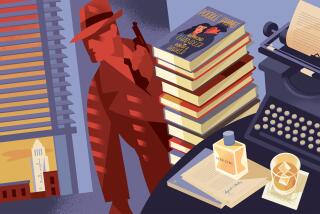Bloomsday and James Joyce
“History is a nightmare from which I am trying to awake.”
Wednesday, people around the world will gather in libraries and theaters, pubs and restaurants, streets and squares to commemorate a precise set of events that included the preceding snatch of conversation and that occurred between daybreak and midnight in a provincial European city on June 16, 1904 — events they know full well never happened.
This, of course, is Bloomsday, the annual celebration of the 20th century’s greatest novel, “Ulysses,” and of the genius of its author, the Irishman James Joyce. How he and his masterpiece came to be lionized so widely is one of cultural history’s strangest and most instructive stories.
Joyce was born to upper-middle-class parents in a fashionable Dublin suburb, but his civil servant father was pensioned off because of his politics and drinking, and the family slid into genteel penury. James nonetheless obtained a first-rate education from the Jesuits and at University College, then Dublin’s alternative to Trinity College, which Irish Catholics were forbidden by their church to attend. (Joyce would describe Trinity in “Portrait of the Artist as a Young Man” as a place “set heavily in the city’s ignorance like a dull stone set in a cumbrous ring.”)
Joyce found his native city’s religious and political pieties stultifying and fled as soon as he was able for the Continent, taking with him his companion, Nora Barnacle. Aside from a couple of hurried business trips, Joyce never returned to Dublin. He ultimately settled his family in Paris, and it was there in 1922 that Sylvia Beach published the first edition of Joyce’s masterpiece, “Ulysses.” It was like nothing ever written before — a novel of 265,000 words divided into 18 “episodes” recounting in complete detail a single day in the outward and inner lives of an ordinary Dubliner, the advertising canvasser Leopold Bloom, his friends and unforgettably unfaithful wife, Molly. (June 16, 1904, was chosen because it was the date of his first walk with Nora.)
Joyce told his friend Frank Budgen that his intention was “to give a picture of Dublin so complete that if the city one day suddenly disappeared from the Earth, it could be reconstructed out of my book.”
From the start, “Ulysses” enjoyed a tumultuously divided reception. The American editors of the Little Review, which serialized the novel as Joyce wrote it, were prosecuted for obscenity. Customs authorities in England, Ireland and the United States seized and destroyed copies of the completed novel. The era’s greatest writers felt differently. T.S. Eliot called it “the most important expression which this present age has found,” a “book to which we are all indebted, and from which none of us can escape.”
Wednesday, Dublin will be awash in commemorations, from dramatic readings to special breakfasts including the kidneys that Leopold purchased and fried for Molly before he set out. Thousands will consume the lunch he ate in Davey Byrnes, “the moral pub” — a gorgonzola sandwich and a glass of burgundy. Joyce’s alma mater, University College, will confer a medal named for him on the German philosopher Jurgen Habermas.
“St. Joyce has replaced St. Patrick in the new, post-Catholic Ireland,” the columnist and critic Fintan O’Toole once quipped to me.
That doesn’t explain the many who will gather in American cities to observe Bloomsday. There will be dramatic readings, broadcast on the Web, in various theaters up and down New York’s Broadway and special commemorations at Philadelphia’s Rosenbach Museum & Library, where the autographed manuscript copy of “Ulysses” is housed. Many will listen to the readings and lectures because they’ve never read the apotheosis of high modernism. In fact, the book may grow more inaccessible each year, since most young readers lack the grounding in the classics that Joyce took for granted in his future audience.
Declan Kiberd, the most original of contemporary commentators on Joyce, speculates that the enduring appeal of “Ulysses” rests in the author’s egalitarian impulse that transformed the ordinary into the epic; that ended in quiet fellowship between the petty bourgeoisie Bloom and the poet, Stephen Dedalus; with Molly’s deathlessly erotic monologue and the realization that she loves Leopold still.
Or perhaps we celebrate Bloomsday because, as Joyce put it, “If Ulysses isn’t fit to read, then life isn’t fit to live.”
More to Read
Sign up for our Book Club newsletter
Get the latest news, events and more from the Los Angeles Times Book Club, and help us get L.A. reading and talking.
You may occasionally receive promotional content from the Los Angeles Times.









